
This parent guide supports parents in helping their child at home with the 6th grade Science content.
- Subject:
- Science
- Material Type:
- Reference Material
- Vocabulary
- Author:
- Kelly Rawlston
- Letoria Lewis
- Date Added:
- 10/11/2022

This parent guide supports parents in helping their child at home with the 6th grade Science content.

This resource accompanies our Rethink 6th Grade Science course. It includes ideas for use, ways to support exceptional children, ways to extend learning, digital resources and tools, tips for supporting English Language Learners and students with visual and hearing impairments. There are also ideas for offline learning.

Please make a copy and edit to fit the needs of your students.
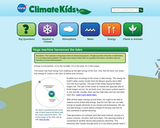
Following a brief introduction to tidal energy, this article discusses the use of tidal generators to convert that energy into electricity. The article also features a description and images of the Invergordon, Scotland tidal energy generator. This lesson is part of the Climate Kids website, a NASA education resource featuring articles, videos, images and games focused on the science of climate change.
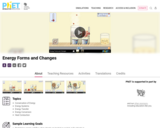
Sample Learning Goals
Predict how energy will flow when objects are heated or cooled, or for objects in contact that have different temperatures.
Describe the different types of energy and give examples from everyday life.
Describe how energy can change from one form of energy into another.
Explain conservation of energy in real-life systems.
Design a system with energy sources, changers, and users and describe how energy flows and changes one form of energy into another.
Tell the energy story for real-life systems.
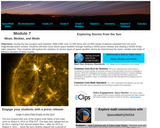
During the last sunspot cycle between 1996-2008, over 21,000 flares and 13,000 clouds of plasma exploded from the Sun's magnetically active surface. Students will learn more about space weather through reading a NASA press release and viewing a NASA eClips video segment. Then students will explore the statistics of various types of space weather storms by determining the mean, median and mode of different samples of storm events. This activity is part of the Space Math multimedia modules that integrate NASA press releases, NASA archival video, and mathematics problems targeted at specific math standards commonly encountered in middle school textbooks. The modules cover specific math topics at multiple levels of difficulty with real-world data and use the 5E instructional sequence.

This course was created by the Rethink Education Content Development Team. This course is aligned to the NC Standards for 6th Grade Science.

This course was created by the Rethink Education Content Development Team. This course is aligned to the NC Standards for 6th Grade Science.

This course was created by the Rethink Education Content Development Team and is aligned to the NC Standards for 6th Grade Science.

Project Summary
In this lesson students will learn about electromagnetic energy through a female engineer who invented frequency hopping that is used by so many devices we use daily. Students will explore and solve a real world problem by designing a device to block or build a stronger Wi-Fi signals. Each team will record their work with Flip.
Driving Questions / Scenario (what are we trying to solve or improve?)
What is the electromagnetic spectrum?
Which part of the electromagnetic spectrum does Wi-Fi use?
What materials do you think will block a Wi-Fi signal? What materials do you think will let a Wi-Fi signal pass through?
Literacy Connection
Hedy Lamarr's Double Life: Hollywood Legend and Brilliant Inventor
By: Laurie Wallmark
Subject(s)
6th grade science, computer science, engineering, ELA, History
Standard(s) Addressed
Sc- - 6.P.1 Understand the properties of waves and the wavelike property of energy in earthquakes, light and sound. 6.P.3 Understand characteristics of energy transfer and interactions of matter and energy.
ISTE - 1.1.b, 1.2.b, 1.3.d, 1.4.a-d, 1.5.b, 1.6.d,1.7.d, 1.7.c
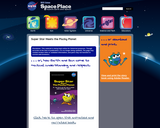
This is an animated and narrated storybook about the Sun and its effects on Earth. Learners will read or hear about characteristics of the Sun and Earth that influence their interaction. Topics touched upon include star sizes, star life cycle, stellar core nuclear processes, plasma, solar flares, coronal mass ejections, solar wind, electromagnetic spectrum, Earth’s magnetosphere, and electromagnetic energy.
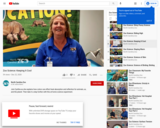
Join Cynthia as she explains how colors can effect heat absorption and reflection for animals, us, and the planet. Then take it a step further with this at home science experiment.
We have created helpful clips if you're unable to watch the full video:
4.L.1 Polar Bear Skin and Fur (1 min 50 sec): https://youtu.be/m8CFTVlLTkk?t=184
6.P.3 Dark colors absorb heat, light colors reflect heat (1.5 min): https://youtu.be/m8CFTVlLTkk?t=95
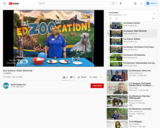
Did you ever wonder what caused that *Zap* when you touch a door knob? Join Nikki as you explore the science (and fun!) behind static electricity! The entire video covers Science Standards 3.P.3 and 6.P.3.
We have created some helpful clips if you are unable to watch the full video:
3.P.3 - Rubbing balloon on hair (3.5 min): https://youtu.be/7E8NxEyhCYQ?t=266
6.P.2 - Explanation of Atoms (3 min): https://youtu.be/7E8NxEyhCYQ?t=55